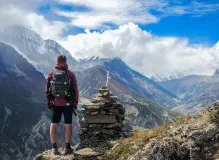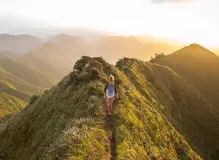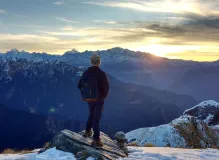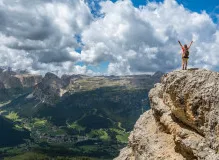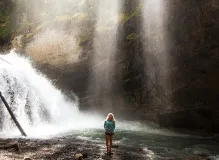For over long years, we have diligently conducted independent research and product testing. When you make a purchase through our links, we may earn a commission.
Uncover the Surprising Advantages of Hiking and Trekking
Created: 2 weeks ago

15 min Read
Keywords: benefits of hiking and trekking
Hiking and trekking are popular outdoor activities that allow individuals to reconnect with nature and enjoy the beauty of the great outdoors. They offer numerous physical, mental, and emotional benefits that can enhance overall well-being. In this blog post, we will explore the various benefits of hiking and trekking and understand why these activities have become a favorite pastime for many. So, whether you are a seasoned hiker or someone who is new to the world of outdoor exploration, let's delve into the incredible advantages that hiking and trekking have to offer.
Physical Benefits
Hiking and trekking are excellent forms of exercise that can boost cardiovascular health and improve overall fitness levels. These activities involve walking long distances over varying terrains, which helps to strengthen muscles, burn calories, and improve stamina. Regular hiking and trekking can enhance joint flexibility, build stronger bones, and improve balance and coordination.
Mental and Emotional Benefits
Spending time in nature has been shown to have a positive impact on mental health and well-being. Hiking and trekking allow individuals to disconnect from the stressors of daily life and immerse themselves in the tranquility of natural surroundings. The fresh air, scenic views, and peaceful ambiance can help reduce anxiety, alleviate depression, and improve overall mood.
Connection with Nature
One of the primary benefits of hiking and trekking is the opportunity to connect with nature in its purest form. Being surrounded by awe-inspiring landscapes, lush forests, and majestic mountains can evoke a sense of wonder and awe. It provides a chance to appreciate the beauty and intricacies of the natural world, fostering a deeper connection with the environment.
Social Connection and Community
Hiking and trekking often bring people together, whether it's joining organized hikes or exploring with friends and family. Engaging in these activities can foster social connections, build camaraderie, and create lasting memories. Additionally, participating in hiking groups or clubs can provide a sense of community and support, offering opportunities to meet like-minded individuals who share a passion for outdoor adventure.
Conclusion
In conclusion, hiking and trekking offer a multitude of benefits that encompass physical fitness, mental well-being, connection with nature, and social interaction. By embracing these activities, individuals can enjoy a holistic approach to wellness while immersing themselves in the wonders of the natural world. So, lace up your boots, pack your backpack, and embark on your hiking and trekking journey to experience the incredible benefits that await you.
Remember, the journey is just beginning!
Hiking and trekking offer a myriad of physical benefits that can greatly improve your fitness levels. One of the primary advantages is that these activities serve as excellent forms of exercise, helping to boost cardiovascular health and overall fitness. As you traverse varying terrains and walk long distances, your muscles are engaged, leading to increased strength and flexibility. Not only does this build lean muscle mass, but it also aids in burning calories and maintaining a healthy weight.
Additionally, the repetitive motion of hiking and trekking can improve joint flexibility and promote better range of motion. This is especially beneficial for individuals who struggle with stiffness or joint pain. By regularly engaging in these outdoor activities, you can help maintain strong bones and reduce the risk of osteoporosis.
Another physical benefit of hiking and trekking is the improvement in balance and coordination. The uneven surfaces and challenging trails require you to adapt and navigate through different obstacles. Over time, this can greatly enhance your body's proprioception, making you more agile and coordinated in your movements.
It's important to start slowly and gradually increase the intensity and duration of your hiking and trekking adventures. This allows your body to adapt and avoid the risk of injury. Regardless of your fitness level, these activities can be tailored to suit your needs and abilities, making them accessible to everyone.
In summary, the physical benefits of hiking and trekking are numerous. From improving cardiovascular health and building strong muscles to enhancing joint flexibility and coordination, these activities offer a comprehensive approach to physical fitness. So, put on your hiking boots, grab your backpack, and embark on a journey that will not only challenge you physically but also leave you feeling energized and rejuvenated.
Mental Health Benefits: Enhance Your Wellbeing Through Outdoor Exploration
Hiking and trekking not only improve physical fitness but also offer a multitude of mental health benefits. The serene and picturesque natural surroundings provide a perfect escape from the stressors of everyday life. Let's delve into the remarkable effects of these outdoor activities on your mental wellbeing.
1. Reduced Stress and Anxiety: Spending time in nature has a calming effect on the mind and body. The peaceful ambiance, fresh air, and soothing sounds of nature can help reduce stress and anxiety levels. The rhythmic motion of walking and the beauty of the surroundings create a sense of tranquility, promoting relaxation and mental rejuvenation.
2. Improved Mood and Mental Wellbeing: Engaging in hiking or trekking releases endorphins, also known as "feel-good hormones." These hormones help elevate mood and promote a sense of happiness and wellbeing. The exposure to natural sunlight during outdoor activities further enhances the production of serotonin, a neurotransmitter associated with feelings of happiness and satisfaction.
3. Boosted Cognitive Function: The combination of physical exercise and exposure to nature positively impacts cognitive function. Studies have shown that being outdoors improves focus, attention span, and creative thinking. It enhances problem-solving skills, memory retention, and overall cognitive performance. So, the next time you're feeling mentally drained, swap the office chair for a hiking trail to recharge your brain.
4. Stress Reduction and Improved Sleep: Hiking and trekking contribute to improved sleep quality and a reduction in insomnia symptoms. The physical exertion during outdoor activities helps in burning off excess energy and releasing tension, leading to better relaxation and more restful sleep. The combination of increased physical activity, exposure to natural light, and reduced stress levels promotes a healthier sleep-wake cycle.
5. Connecting with Nature: Being surrounded by the beauty of nature has a profound impact on mental wellbeing. The awe-inspiring landscapes, vibrant colors, and the calming sound of rustling leaves or flowing water can evoke a sense of wonder and appreciation. This connection with nature boosts feelings of happiness, contentment, and overall life satisfaction.
Through hiking and trekking, you can tap into the immense mental health benefits that come with immersing yourself in nature. So, lace up your hiking boots, breathe in the fresh air, and embark on a journey that enhances both your physical and mental wellbeing.
Social Benefits: Forge Stronger Connections Through Group Hiking and Trekking
In addition to the physical and mental benefits, hiking and trekking also offer numerous social advantages. Engaging in these activities as part of a group or with friends and family can enhance social connections, build camaraderie, and create a sense of community.
Joining Organized Hikes and Clubs
One way to experience the social aspect of hiking and trekking is by joining organized hikes or clubs. These groups provide opportunities to meet like-minded individuals who share a passion for outdoor adventure. It's a chance to connect with people who have similar interests and enjoy exploring nature together. Through organized hikes and clubs, you can make new friends, learn from experienced hikers, and expand your social circle.
Building Camaraderie on the Trail
Hiking and trekking with friends and family also offer the chance to bond and forge stronger connections. The shared experience of overcoming challenges and appreciating the beauty of nature can bring people closer together. As you tackle steep trails, cross rivers, or set up camp, you'll rely on teamwork, communication, and support from one another. These shared moments create lasting memories and strengthen existing relationships.
Creating a Sense of Community
The hiking and trekking community is known for its inclusivity and support. Whether you're a seasoned hiker or a beginner, you'll find that fellow outdoor enthusiasts are welcoming and eager to share their experiences. Participating in online forums, attending hiking events, or joining local hiking groups can help foster a sense of belonging and create a supportive network of individuals who encourage and inspire one another.
Comparing Solo vs. Group Hiking
While solo hiking has its merits, there's often a unique joy that comes from hiking in a group. Let's compare the benefits of solo hiking and group hiking:
| Solo Hiking | Group Hiking |
|---|---|
| Opportunity for self-reflection and solitude | Enhanced safety and security |
| Freedom to set your own pace and itinerary | Shared experiences and memories |
| Deep connection with nature | Built-in social support and encouragement |
| Self-reliance and independence | Opportunities for new friendships and networking |
| Personal growth and self-discovery | Collaboration, teamwork, and camaraderie |
Conclusion
Hiking and trekking provide more than just physical and mental benefits. The social aspect of these activities allows individuals to connect with others who share a love for the outdoors. Whether you join organized hikes or explore with friends and family, you can build strong connections, create lasting memories, and become part of a supportive community. So, grab your hiking boots, gather your loved ones, and embark on a journey that not only enriches your own life but also brings you closer to those around you.
Hiking and trekking not only provide personal benefits but also have a positive impact on the environment. By engaging in these activities, individuals can contribute to the promotion of conservation and sustainability. Here are some ways in which hiking and trekking benefit the environment:
Preservation of Natural Areas: Hiking and trekking trails are often designed to lead individuals through protected natural areas. By following these designated paths, hikers and trekkers are encouraged to stay on the established routes, minimizing the impact on delicate ecosystems. This helps preserve the natural beauty of the surroundings and protects sensitive plant and animal species.
Education and Awareness: Hiking and trekking often involve encounters with unique flora and fauna, geological formations, and natural wonders. These experiences can serve as educational opportunities, raising awareness about the importance of conservation and environmental stewardship. By witnessing the beauty and fragility of the natural world, individuals are more likely to develop a sense of responsibility towards its preservation.
Leave No Trace Principles: Hikers and trekkers are encouraged to follow the "Leave No Trace" principles, which promote responsible outdoor practices. These principles include leaving nature as you found it, properly disposing of waste, minimizing campfire impact, and respecting wildlife. By adhering to these guidelines, the negative impact on the environment is minimized, ensuring that future generations can also enjoy the natural wonders of our planet.
Supporting Local Economies: Many hiking and trekking destinations are located in remote or rural areas, where local economies may heavily rely on tourism. By visiting these areas and engaging in outdoor activities, hikers and trekkers contribute to the local economy, which, in turn, supports the preservation of natural areas and encourages sustainable development practices that benefit both the environment and local communities.
Conservation Initiatives and Organizations: Hiking and trekking communities often align themselves with conservation initiatives and organizations that work towards the preservation of natural landscapes. These groups facilitate trail maintenance, habitat restoration, and environmental education programs. By supporting these initiatives and organizations, hikers and trekkers actively contribute to the conservation efforts and long-term sustainability of our natural resources.
By engaging in hiking and trekking activities, individuals can become ambassadors for the environment, promoting conservation and sustainability. Through responsible outdoor practices, education, and support for conservation initiatives, hikers and trekkers can make a positive impact on the natural world, ensuring that future generations can continue to enjoy the wonders of our planet. So, put on your hiking boots, embrace the call of the trails, and become an advocate for the environment as you explore the great outdoors.
Exploring Unique Destinations: Discovering Hidden Gems on Hiking Trails
Hiking and trekking not only offer physical and mental benefits but also provide the opportunity to explore unique destinations and discover hidden gems along the way. Unlike traditional tourist attractions, hiking trails can lead you to remote and untouched places that are often off the beaten path. Whether you're traversing through dense forests, climbing majestic mountains, or following the winding paths of a scenic river, each step brings you closer to finding hidden treasures that are waiting to be explored.
Immerse Yourself in Nature's Wonders
One of the greatest rewards of hiking and trekking is the chance to immerse yourself in nature's wonders. As you embark on your trail, you'll encounter breathtaking landscapes, vibrant flora, and diverse wildlife that cannot be experienced in a typical urban setting. From cascading waterfalls to panoramic vistas, every turn offers a new surprise, captivating your senses and allowing you to appreciate the beauty and grandeur of the natural world.
Discover Serene and Peaceful Settings
In the fast-paced world we live in, finding peace and tranquility can be a challenge. However, hiking and trekking provide the perfect antidote to the stresses of daily life. As you venture into the wilderness, you'll encounter serene and peaceful settings that offer a much-needed respite from the noise and chaos of urban living. From quiet meadows and hidden valleys to secluded lakes and pristine beaches, these tranquil spots provide the ideal environment for relaxation, meditation, and rejuvenation.
Encounter Unique Wildlife and Flora
Hiking and trekking take you into habitats that are home to a wide array of unique wildlife and flora. You may catch a glimpse of a majestic eagle soaring overhead or encounter playful squirrels scampering through the trees. The diversity of birds, insects, and mammals that inhabit these areas creates opportunities for wildlife enthusiasts and nature lovers to observe and appreciate the natural world up close. Additionally, hiking trails often showcase a variety of plant species, from aromatic wildflowers to towering ancient trees, adding to the enchantment of the journey.
Experience Cultural and Historical Significance
Many hiking trails also hold cultural and historical significance, providing a rich educational experience for those who venture along them. You may stumble upon ancient ruins, historic landmarks, or traditional villages that offer a glimpse into the past and the stories of people who once thrived in these regions. Learning about the cultural heritage and historical significance of these areas adds depth and meaning to the hiking experience, making it not just a physical exploration but also an intellectual and cultural journey.
Conclusion: Uncover the Hidden Gems
Uncovering hidden gems on hiking trails is a rewarding and enriching experience that allows you to connect with nature, discover unique destinations, and gain a deeper understanding of the world around you. So, lace up your hiking boots, grab your backpack, and embark on an adventure that will take you to places you never knew existed. With each step, you'll uncover the hidden wonders that make hiking and trekking such a remarkable and fulfilling endeavor.
Tips for a Successful Hiking and Trekking Experience: Essential Advice for Beginners and Enthusiasts
Are you ready to embark on a hiking or trekking adventure? Whether you're a beginner or a seasoned outdoor enthusiast, it's always important to be prepared and informed before setting off on your journey. Here are some essential tips to ensure a successful and enjoyable hiking or trekking experience.
1. Research and Plan Your Route: Before you hit the trails, take the time to research and plan your route. Consider factors such as distance, difficulty level, and terrain. It's important to choose a trail that aligns with your skill level and fitness capabilities. You can find trail maps, reviews, and information about different routes online or at local visitor centers.
2. Pack the Necessities: As the saying goes, "It's better to be safe than sorry." Pack essential items such as a map, compass, first aid kit, extra clothing layers, and enough food and water to sustain you throughout the hike or trek. Don't forget to bring sunscreen, a hat, bug spray, and a flashlight. It's also a good idea to pack a whistle, pocket knife, and a waterproof protective case for your phone and other valuables.
3. Wear Proper Gear: Dressing appropriately is crucial for a comfortable and safe hiking or trekking experience. Wear sturdy, comfortable hiking shoes or boots that provide ankle support. Choose moisture-wicking and breathable clothing to keep you dry and comfortable throughout your journey. Layer your clothing to accommodate changing weather conditions. Don't forget to wear a hat and sunglasses to shield yourself from the sun.
4. Stay Hydrated and Energized: Hiking and trekking can be physically demanding activities, so it's essential to stay hydrated and fuel your body with nutritious snacks and meals. Carry enough water to keep you hydrated throughout the journey. Pack lightweight, energy-boosting snacks such as nuts, granola bars, or trail mix. Consider carrying a water filtration system or purification tablets to ensure access to clean drinking water on longer treks.
5. Practice Leave No Trace: As hikers and trekkers, it's our responsibility to protect and preserve the beauty of nature. Follow the principles of Leave No Trace, which include disposing of waste properly, staying on designated trails, and respecting wildlife and vegetation. Minimize your impact on the environment by leaving natural artifacts and wildlife untouched.
6. Start Slow and Take Breaks: If you're new to hiking or trekking, start with shorter and less challenging trails to build your stamina and confidence. Take breaks when needed to rest, hydrate, and appreciate the surroundings. Pay attention to your body's limits and listen to any signs of fatigue or discomfort.
7. Safety First: Prioritize your safety at all times. Let someone know your hiking plans, estimated return time, and any emergency contacts. It's a good idea to hike with a partner or in a group, especially on unfamiliar or remote trails. Be aware of weather conditions and changes in the environment. If you encounter any difficulties or emergencies, stay calm and use your resources (such as a whistle or cell phone) to signal for help.
Conclusion
By following these tips and guidelines, you can ensure a successful and enjoyable hiking or trekking experience. Remember to respect nature, take care of your physical well-being, and be prepared for any challenges that may arise. Hiking and trekking offer incredible opportunities to connect with nature, challenge yourself, and create cherished memories. So, lace up your boots, pack your backpack, and set off on your next outdoor adventure with confidence and excitement!
Frequently Asked Questions (FAQs)
What are the health benefits of hiking and trekking?
Hiking and trekking offer numerous health benefits such as improved cardiovascular fitness, increased muscle strength and endurance, weight loss, and improved mental health.
Are there any mental benefits of hiking and trekking?
Yes, hiking and trekking have been shown to reduce stress, anxiety, and depression, improve mood and overall mental well-being, and enhance cognitive function.
What are the environmental benefits of hiking and trekking?
Hiking and trekking promote a deeper connection with nature, foster environmental awareness and conservation, and contribute to the protection and preservation of natural landscapes.
Do hiking and trekking help improve social connections?
Absolutely! Hiking and trekking provide opportunities for socializing and making new friends, whether it's joining group hikes, participating in organized treks, or simply meeting fellow outdoor enthusiasts on the trails.
Can hiking and trekking help with personal growth and self-discovery?
Yes, hiking and trekking can be transformative experiences that facilitate personal growth, self-reflection, and introspection. They can help individuals challenge their limits, build resilience, and gain a deeper understanding of themselves.
What are some safety tips for hiking and trekking?
Some safety tips for hiking and trekking include planning your route in advance, informing someone about your plans, staying hydrated, wearing appropriate gear and clothing, carrying essential supplies, and being aware of weather conditions and potential hazards.
Are hiking and trekking suitable for all fitness levels?
Yes, hiking and trekking can be enjoyed by individuals of varying fitness levels. There are trails and routes available for beginners, intermediate hikers, as well as advanced trekkers. It's important to choose a trail that matches your fitness level and gradually increase the difficulty as you progress.
Do hiking and trekking require special equipment?
Basic hiking and trekking equipment include sturdy hiking shoes or boots, comfortable clothing, a backpack, a water bottle, a map or trail guide, sunscreen, insect repellent, and a first aid kit. More advanced treks may require additional gear such as tents, sleeping bags, and cooking equipment.
Where can I find hiking and trekking trails?
Hiking and trekking trails can be found in national parks, state parks, nature reserves, and wilderness areas. You can also find trail maps and information online, through hiking clubs and organizations, or by consulting local outdoor retailers and tourist information centers.
